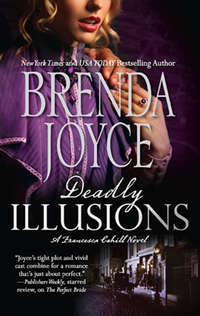
Полная версия
Deadly Kisses
Daisy was dead.
Rose moaned, rocking her again and again.
Francesca was in shock. From the look of her dress, Daisy had been murdered, perhaps with a knife. Horror began as she realized the extent of the wounds on Daisy’s chest.
Who would want her dead, and why? Francesca recalled the last time she had seen Daisy. She and Rose had appeared at the funeral for Kate Sullivan, a murder victim from Francesca’s most recent investigation. There had been no reason for her to attend, except one: to taunt Francesca. She had been hostile and bitter, and she had clearly wanted Hart back. She had done her best to cause tension between Hart and Francesca, and she had wittingly played upon all of Francesca’s insecurities.
That day, outside of the church, she and Daisy had exchanged harsh words. Although Francesca could not remember the exact conversation, she knew she had been upset and dismayed, precisely as Daisy had planned.
But dear God, though Daisy had maliciously done her best to hurt both Francesca and Hart, she had not deserved this.
The questions returned. Who would do this—and why?
Francesca knelt. Rose had not stopped rocking her friend, weeping now in silent grief. Francesca reached out, grasping her arm. “Rose,” she gasped. “I am so sorry!”
Rose froze, slowly looking up. Her green eyes were glazed with misery and tears. She shook her head, unable to speak.
Francesca quickly closed Daisy’s eyes, shivering as she did so. Daisy was impossibly fair, blue-eyed, with platinum hair, her skin the color of alabaster. Delicate and petite, she had a sensuous grace that could only be inherent, never achieved. Now her small bosom was a mass of bloody, gaping flesh. Francesca would never become accustomed to death, and especially not violent death.
She stood, shaking, and decided against turning on more lights. The murder had been a brutal one. Rose did not need to be confronted with the extent of Daisy’s wounds. Francesca took a soft cashmere throw from the sofa, feeling ill, very much so. She inhaled raggedly for control.
“I will find out who did this,” she whispered, aching for Rose now.
Rose looked up accusingly. “Don’t pretend that you care! We both know you hated her because Hart took care of her. I know you hated her for ever having been in Hart’s bed!”
Francesca, still holding the throw, shook her head. She felt a tear tracking down her cheek. “You’re wrong. I do care. I care very much. Daisy did not deserve this. No one deserves this!” She approached and laid a hand on the brunette’s shoulder. “Please. Leave her now. Come, Rose, please.”
Rose shook her head, choking, hugging Daisy more tightly. She was as dark, voluptuous and tall as Daisy was fair, slender and petite. Now she was covered with her friend’s blood.
“I need to go to the police,” Francesca said, thinking of Rick Bragg.
Francesca needed him now. They made an excellent team—they had solved a half a dozen dangerous and difficult cases together, and he remained her good friend. It was late, but he had to be summoned immediately. Together they would find Daisy’s killer.
Hart’s dark, smoldering image came to mind. He might not have ever loved Daisy, but how would he react to the news of her murder? Francesca realized she would be the one to tell him of the death of his former mistress, and un fortunately, she would have to do so the moment he returned home.
“The police?” Rose’s voice was scathing and bitter. “We need to find Daisy’s murderer! I am hiring you, to find the killer, Francesca. Forget those leatherheads! They won’t give a damn about Daisy,” she said, and she began to weep all over again.
Francesca nodded, but her instincts warned her not to take on Rose as a client. She took the opportunity to kneel and cover Daisy’s brutally disfigured body with the throw, then somehow she pulled Rose to her feet, putting her arm around her. “Please, come sit down in the salon,” she said, wanting very much to get Rose out of the room.
But Rose balked. “No. I am not leaving her alone like this!”
Francesca quickly knelt and pulled the throw over Daisy’s face. “I do need to get the police. There has been a murder, and they must be notified. But I don’t want to leave you here alone, Rose.”
Rose sat abruptly on the sofa, her face collapsing into tears again. “Who would do this? And why? Oh, God why?”
Francesca sat besides her, her mind beginning to function fully again. She had received Rose’s note a good half an hour ago, a few moments before midnight. Betty had said the note had been dropped off at the house just a few minutes before they arrived home. The trip uptown from Daisy’s house was thirty minutes in light traffic, so Rose had sent the note around eleven-thirty. “Rose? Can you answer a few questions?”
Rose looked up. “Are you going to find her killer? The police won’t care. I don’t trust those flies.”
Francesca hesitated, recalling Daisy’s hostility the last time they had spoken, and Rose’s own hatred of Hart for taking Daisy away from her. But how could she refuse Rose, who had loved Daisy so? “Yes. Yes, Rose, I will take the case.”
“You will take the case, even though you hated her?”
“I didn’t hate her, Rose. I was afraid of her.”
Rose jerked, meeting Francesca’s gaze. Slowly, she said, “All right. What do you want to know?”
“What happened here tonight? When did you find her?”
Rose swallowed. “I don’t know. I was out for the evening. When I got here, the house was dark, I knew some thing was wrong! I called for her, but she didn’t answer.” Rose stopped, for out in the hall, a soft bump had sounded.
Stiffening, Francesca looked at the open door, as did Rose. The hall beyond was lost in shadow and she saw nothing. But she had heard a noise—someone was present.
Francesca stood. “Where are the servants?”
“The butler sleeps in his room behind the kitchens, as does the maid. The housekeeper goes home at five.” Rose was ashen and wide-eyed now.
“Did you go below stairs when you came home?”
Rose shook her head. “No. I was about to go upstairs when I saw the light coming from this room.” Her mouth trembled and she glanced at Daisy’s covered body. She inhaled, clearly fighting more tears.
“Wait here,” Francesca said. She glanced at the desk, saw a letter opener and took it. Then she changed her mind, putting it back and taking a crystal paperweight instead. After what had been done to Daisy, she did not think she could stab anyone. Clutching the paperweight, she left the study. The corridor outside remained dark and every blond hair on her nape prickled with dread and fear.
Someone was lurking in the corridor leading to the kitchen and servants’ quarters. But it would make little sense for that someone to be the killer, who must have long since fled. It was probably just a servant.
On the other hand, murderers often defied every possible assumption one might make about them.
Francesca took a deep breath for courage, once more wishing she had her gun, and she started forward, trying to make as little noise as possible. She heard footsteps approaching—each footfall slow and cautious. She froze.
Her grip on the paperweight tightened. She debated turning to flee, but in a moment whoever was beyond her would appear and see her. Instead, she pressed against the wall, waiting. The shadowy form of a man appeared, carrying a candle. He saw her against the wall, halted in midstride and lifted the candle higher.
Francesca was illuminated—but so was he.
Standing there in the hall was her fiancé.
CHAPTER TWO
Tuesday, June 3, 1902—12:45 a.m.
FRANCESCA WAS DISBELIEVING. Hart was the very last person she had expected to see. What was he doing in the city?
And then she saw the dark stain on Hart’s white shirt, where his suit jacket was unbuttoned. “Calder?”
He hurried toward her, his own surprise fading. “Francesca!” he exclaimed, and his expression changed, becoming displeased. “Why am I not surprised to find you here?”
“Are you hurt?” she demanded, but the beginnings of a terrible fear had crept into her mind. Somehow, she knew the blood was Daisy’s. She stiffened, staring up at his dark, handsome face.
“I’m not hurt.” He took her arm, as if to steady her. “Daisy is dead, Francesca.”
She met his probing regard, her mind scrambling to sort through the confusion. “I know.”
“The blood is hers, Francesca, not mine. I found her in the study. She had been stabbed.”
Their eyes met. All of Francesca’s shock suddenly vanished. He was supposed to be in Boston. When had he returned to town and why hadn’t he called her? What was he doing here at Daisy’s, in the kitchen and servants’ quarters? Given the blood on the front of his shirt, he had held Daisy, too, the way Rose had. Some thing sharp and distasteful filled her: dread. “Calder, Rose said she found Daisy. In fact, she sent me a note asking me to come here.”
“When I arrived, Rose wasn’t here.” His regard held hers. “I found Daisy on the floor of the study, very much alone.” He looked away from her now. His composure was usually rock solid, but Francesca saw that he was struggling to maintain it. “She was already dead.”
Francesca swallowed, feeling ill. “You checked for a pulse?”
He met her gaze. “Yes.”
Francesca felt as if she were interrogating a suspect. Of course, that was not the case. “When did you arrive here, Calder?”
His look was sharp. “I left my home around eleven,” he said. Then, softly, with warning, he added, “I do not want you involved, Francesca.”
Francesca’s tension rose. She was already involved, because Daisy had once been Hart’s mistress, because she had once been Francesca’s friend and because she had recently been her rival.
“Francesca,” he said, his tone pointed, and he took her wrist.
She looked into his eyes. “Daisy is dead, Hart. She has been murdered. I think we are both involved.”
He turned away, but not before Francesca saw the anguish in his eyes. She was shocked. Had she imagined it, or did Calder have some feelings for Daisy still, after all of this time?
He slowly faced her. “You are staring.” His tone had softened and his hand slipped to her palm. “Francesca, I am also in shock. We had better summon the police.”
Her heart raced with painful force. If she had seen anguish in his eyes, it was now gone. He seemed grim, but not grief-stricken. Of course he would be distraught that a woman he had once known intimately was dead. “Calder, what are you doing here?”
He hesitated, his expression hardening. “I finished my affairs in Boston earlier than expected. I arrived at Grand Central at a quarter to seven this evening.” He met her gaze directly. “After I found Daisy, I decided to look for the killer. I was about to do so when Rose came into the house. She was not wearing any wrap—clearly she had just stepped out. I hid. She went directly to the study, Francesca, directly to Daisy. I followed her. She was not surprised to see Daisy murdered.”
Francesca’s mind raced. Calder had not answered her question. He had not told her why he was at Daisy’s in the first place. Any affairs that remained between him and Daisy were of a financial nature. Such concerns could have waited. It was well after midnight now.
If he had left his uptown home at eleven, he would have arrived at Daisy’s perhaps an hour ago. What had he been doing in the house for all of that time? Her pulse quickened with fear. She did not have to be thinking all that clearly now to know that Hart could be in trouble with the law. “And then what happened?”
“I left her and went to search the house.” He released his hand from hers and tilted up her chin. “You’re upset. I am, as well. We’ll get through this, Francesca.”
Francesca tried to smile at him and was fairly certain she had failed. “Of course we will. But Daisy is dead, Calder. As malicious as she was toward me, toward us—she did not deserve to die, and certainly not so violently.”
His face tightened and something dark and deep flared in his eyes. “No. As much trouble as she caused us recently, she did not deserve to die.”
Suddenly Francesca recalled that day last month out side of the church. After taunting her, Daisy had walked away. Hart had come outside, the memorial service over. He had been grim and resolute, and he had told her in no uncertain words not to worry.
I will take care of Daisy. Those had been his exact words. Now Francesca felt a surge of fear and she tried to think if anyone might have overheard his statement. Of course, Calder hadn’t meant he would murder Daisy; he had meant he would make sure that she no longer bothered either one of them. But Daisy had been his mistress until a few months ago, and he continued to support her financially. Francesca had investigated enough crimes of passion to know that Hart should be kept out of this case. “Calder, you should leave right now. I will find a roundsman and alert Bragg. Did any one else see you? Did Rose see you?”
He gave her an odd look. Softly, he said, “Are you trying to protect me, Francesca?”
She stiffened, but that single look caused her heart to skip. “Very well, I confess. Yes, I want to protect you. You should stay as far away from this house and the murder scene as possible.” It crossed her still-dazed mind that she would have to lie to the police, if no one was to know that Calder had been at Daisy’s that night. She didn’t know how she would manage telling such a lie to Rick Bragg.
Hart’s eyes smoldered. “I already spoke to Homer, the butler, and the housemaid. They are in their quarters, where I told them to remain. They both know I am here. I don’t think Rose saw me. I found Daisy murdered, Francesca—I didn’t murder her myself.”
He was angry and she knew it. Quickly she took his hand but he shook her off. “Hart! I know you didn’t kill her!” Of that, she had no doubt. “But you were here on the night of her death. You could be implicated.” Francesca hoped that the coroner would discover that Daisy had been killed before a quarter to seven that evening.
“You don’t need to protect me, Francesca,” he said. “Besides, half the city knows I have been keeping her. I cannot deny our relationship. But remember, Rose was here before me.”
“That is your word against hers.” Francesca rubbed her temples, which throbbed. No good was going to come of this. A crystal ball could not have been clearer! If she did not find another suspect, and quickly, the police were going to consider Hart a prime suspect. She looked up and found him regarding her steadily, his gaze far too intent.
Suddenly he softened. He reached out and touched her cheek. “Why are we arguing? You don’t need to protect me, Francesca, as I have done nothing wrong. And I have been fending for myself since I was a small boy, stealing scraps of food on the streets. And I have missed you,” he added even more softly, and his tone was impossible to resist.
“I have missed you, too,” she whispered shakily, moving into his arms as he reached out to her. She stood there, still grieving yet overcome with relief, pressed against his hard, powerful body. This was where she most wanted to be. Something terrible would come of this case, she just knew it. She was afraid for him, for her, for them both. But as afraid as she was, she had never loved him more.
Hart held her silently for a long moment, and she felt his strong heart begin to increase its beat. Her own pulse could not help but skip and dance when she was in his arms. Francesca lifted her face.
He touched her lips with his, once, twice, three times.
Beneath the gentle brushing, Francesca sensed his urgency and need. In response, as always, a fire roared to life in her veins. Their eyes met and held. Then Hart stepped back. “We should respect the dead,” he said seriously.
“Yes, we should.” Francesca folded her arms across her chest and gave herself a moment to refocus. “Rose is with…the body.”
“Rose,” he repeated. “Could she have murdered the woman she loved? Might she have already been here when I arrived? When did she send you this note, Francesca?”
Francesca could not imagine Rose killing her best friend, but she would consider it, of course. “The note arrived at my home before midnight. Let’s estimate that it arrived by a quarter to the hour. Rose wrote and sent the note around eleven or shortly thereafter. She was undoubtedly sending me the note, which came by cab, when you walked in.” It crossed her mind that most of the suspicion could be directed at Rose. “She found the body before you did. She was first on the scene.”
He stared for a moment. “I have never trusted Rose. Why did she send for you, of all people? There was no love lost between any of us.”
Francesca hesitated.
“Let me guess,” he said sarcastically. “She wants you to find the killer?”
Francesca bit her lip. “Calder,” she began, deter mined to head him off at the pass. Even though he was always supportive of her investigations and proud of her success in them, she knew why he did not want her on this particular case—and the reason was Daisy. “This is a crime of passion. I do not think it will be hard to find the killer. From what I saw,” she added, an image of Daisy’s mutilated chest coming to mind, “someone stabbed Daisy repeatedly in a fit of anger.”
“You cannot predict the nature of this investigation!” Hart exclaimed. “Do not mistake me now, Francesca, this is one case where I do not want you involved.” His look was uncompromising.
“But I am involved. She was your ex-mistress and I am your fiancée.” Francesca tried to be firm and gentle at once.
He made an angry sound and took her arm. “I am asking you, this one single time, to leave the investigation of Daisy’s murder alone.”
That terrible feeling of dread rose swiftly up again. Francesca stole a look at Hart’s angry expression, her heart sinking. Now was clearly not the time to tell him that nothing and no one—not even Hart—could stop her from finding Daisy’s killer. But why did he want her off the case so badly? Surely he had nothing to hide, not from her.
“This is too personal for us both,” Hart said in a calmer tone, as if that explained his reasoning, but it explained nothing at all.
“Yes, it is personal for us both,” Francesca said noncommittally. She was aware of the exasperated look he cast at her, but now she was wondering about Rose. She had yet to ask her exactly when she had found Daisy. Given the extent of her grief, it was possible she had sat with her dead friend for quite some time before writing Francesca the note. One fact was clear—Daisy had been murdered before eleven or half past eleven p.m., when Rose had sent Francesca the note.
Together, they moved toward the study, where the candle continued to flicker. As they approached, Francesca’s steps slowed, as did Hart’s. His grasp on her hand tightened, but with reassurance, not warning. Francesca glanced at him and he tried to smile at her, but the curve of his firm mouth could not extinguish the sadness in his dark navy blue eyes.
He was far more upset than he was letting on, she thought with dismay. God, what if he still had feelings for Daisy? Could she possibly manage that, when Daisy had always felt like a threat to her relationship?
Rose was now sitting on the sofa, curled up like a child, her knees to her chest, the dark green evening gown she wore stained with blood. Daisy remained on the floor, covered from head to toe with the throw. Hearing their footsteps, Rose looked up.
She shot to her feet, pointing, her hand shaking. “You! I should have known! You goddamned bastard! You killed her!”
Police Commissioner Accused of Dereliction of Duty
Commissioner Bragg Fails Reformers
Civic Leaders Outraged with Police Policy
IN DISGUST, RICK BRAGG swept all three newspapers from his desk, cradling his head in his hands. His head ached and he was impossibly tired. He had never felt more worn, and that had nothing to do with the fact that the grandfather clock in the hall had just chimed a single time, indicating it was one in the morning. Right now, he almost regretted accepting the mayor’s appointment, an appointment that had initially been filled with excitement and hope. He was the first police commissioner since Teddy Roosevelt to attempt the monumental mission of reforming the city’s notoriously corrupt police force. But the hottest issue of the day was his undoing, especially as the mayor had tied his hands behind his back, refusing to allow him to do his job as he wished to do it.
Bragg sighed and reached for his bourbon. Mayor Low was already afraid of the vast German vote and had decided to ask the police not to enforce the blue laws, which required the closing of saloons on the Sabbath. Yet every reform group in the city was in favor of such closings. But after a series of crackdowns, Tammany Hall had made it a point to stir up as much trouble for Bragg and his force as possible. The German workers of the city were in an up roar, demanding their rights in protests and petitions. Afraid of losing reelection, Low had told Bragg to back off.
Low was good for the city. He was a man dedicated to social and political reform and he was courageous enough to oppose Tammany Hall. He was also Bragg’s boss. There was no way Rick could refuse his orders, even if it meant compromising his own oath to uphold and obey the law.
He could please no one now. The reformers, led by the clergy and the city’s progressive-minded elites, wanted his head and his resignation. So did half of his own force, due to the internal shake up he had inflicted these past five months, reassigning officers left and right to break up the rings of graft and bribery that manacled the city in a web of corruption and lies. Low had made it clear that he wished for Rick to continue on; given the circumstances, he was pleased with the internal cleanup of the force. Rick hadn’t really been considering resignation, but sometimes, on an endless day like this one, it crossed his mind.
He was never at home, and his family had never needed him more.
He drank, finishing the bourbon and pouring another one. His family. Images of his beautiful wife and the two little girls they had decided to adopt filled his mind. Who was he fooling? He had finished all the urgent paperwork an hour or two ago and had chosen to linger over the damn dailies, with their accusatory headlines, because he was afraid to go upstairs.
He was afraid to go to the bedroom he shared with his wife, afraid to go to their bed.
He leaned his face on his hands, closing his eyes, so tired he thought he could fall asleep at his desk. And it wasn’t the job, it wasn’t the corruption, it wasn’t the politics—it was the impossible personal and private dilemma he found himself in. How much longer could he go on this way?
He had become a stranger to his family, a stranger to the little girls who needed him—a stranger to his wife.
And she wanted it that way.
He stood abruptly, terribly torn. A part of him was ruthlessly determined to go up those stairs, climb into her bed and simply hold her, even though he would find her stiff with tension, pretending to be asleep. When he reached for her, he knew she would turn away, refusing to allow him any opportunity for comfort or intimacy. And he could not blame her.
Leigh Anne had said she did not hold him responsible for the accident that had caused her to lose the use of her legs, but he blamed himself—and knew that, deep down, she blamed him, too.
Once, he had thought their marriage over. Years before the accident, soon after they were first married. She had left him to travel in Europe and he had hated her passionately. Now, too late, he had faced the extent of his passion. He still loved her and he always had. But it had become painfully obvious that she no longer cared in return. He knew what he should do. He should give her the freedom she clearly wanted, but how could he? Who would take care of her if he did so? And what about the girls? If he left Leigh Anne, it would mean the loss of his family.









